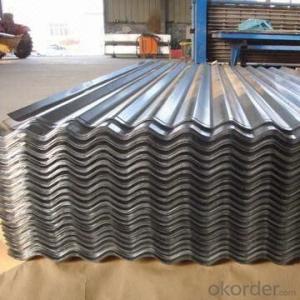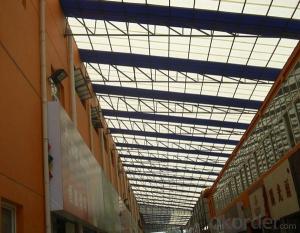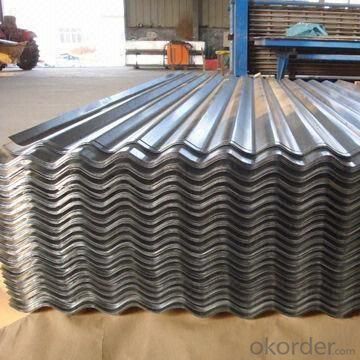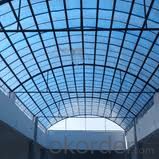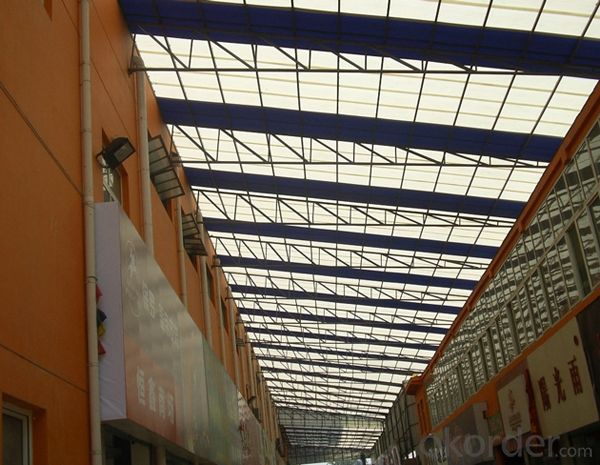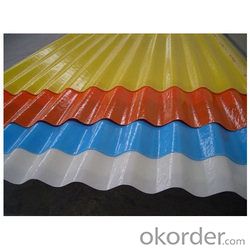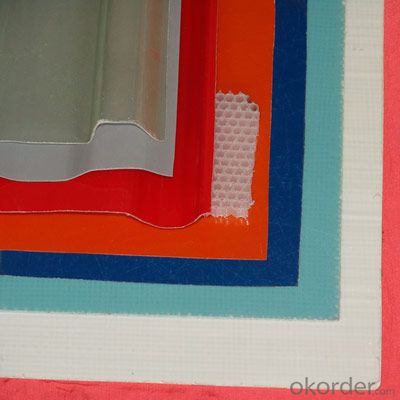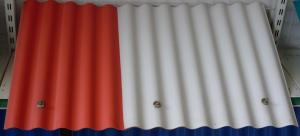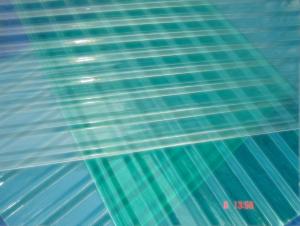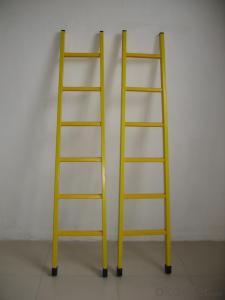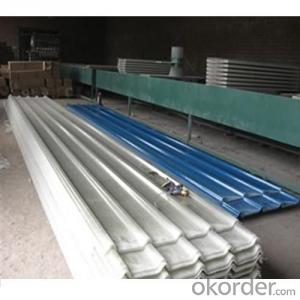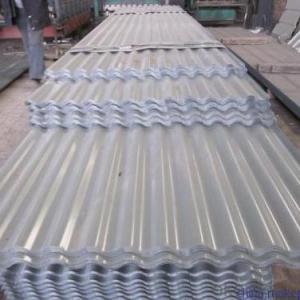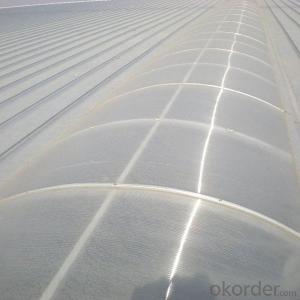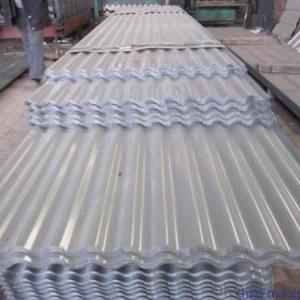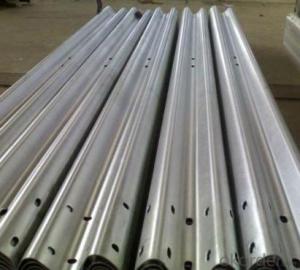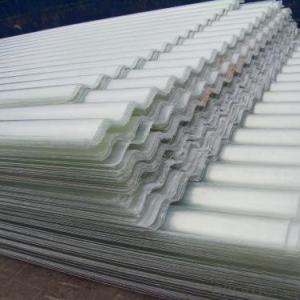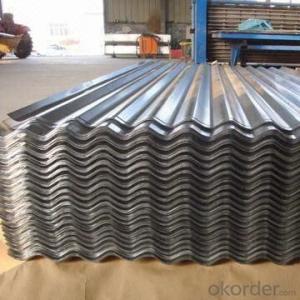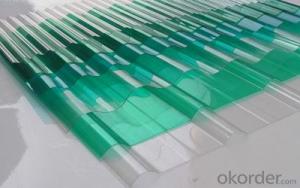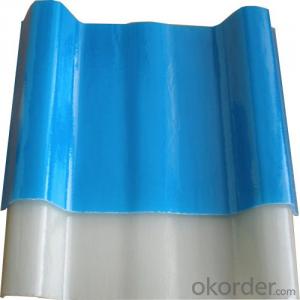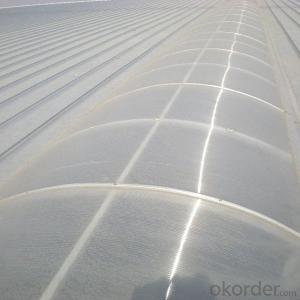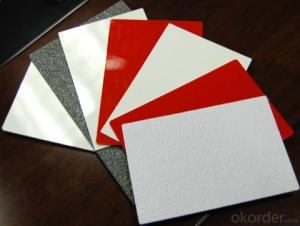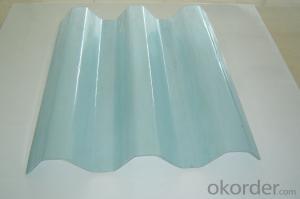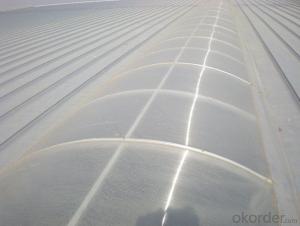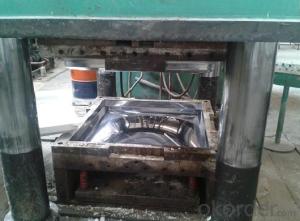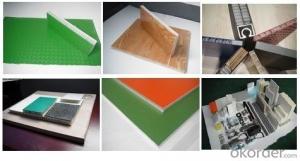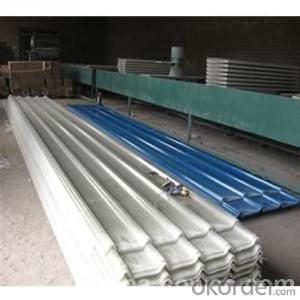FRP Roofing Panel - UV Blocking FRP Lighting Board, High Transmittance
- Loading Port:
- Shanghai
- Payment Terms:
- TT OR LC
- Min Order Qty:
- 200 m
- Supply Capability:
- 100000 m/month
OKorder Service Pledge
OKorder Financial Service
You Might Also Like
Specification
PRODUCT DESCRIPTION
FRP lighting board full name is Fibreglass Reinfored Polyester,is also named glass fiber reinforced polyester (FRP plate), glass steel, also called transparent tile. And steel structure supporting the use of natural lighting material, which is mainly composed of a high performance membrane, strengthen polyester and glass fiber group into.
FEATURES
1.corrosion resistance no rust, no maintenance, long service life.
2.lightweight, high strength pultrusion process molding FRP profiles have high glass fiber content (60%), the one way than intensity and stiffness is quite prominent, the density of glass fiber reinforced plastic is only about a quarter of the steel, light weight, very easy to handle, so as to reduce the handling fee.
3..Anti-fatigue high anti- fatigue strength, allowing repeated bending without permanent deformation.
4.anti-aging select highquality FRP pultrusion profiles, the service life of the product can reach more than 20 years, and in all the pultrusion FRP profiles were added in the formula of an-uv agent in order to get the best anti-uv effect.
5.excellent electromagnetic performance it has excellent electrical insulation, electrical, magnetic and electric spark can be used in risk conduction, sensitive to magnetic equipment area, and flammable and explosive place.
SPECIFICATION
Product | Item | Unit | Value |
FRP sheet | Thickness | mm | 1.0-2.5 |
Width | mm | <2500< span=""> | |
Length | mm | Customized or produce in roll | |
Density | g/cm3 | 1.45 | |
Tensile strength | MPa | 124 | |
Bending strength | MPa | 195.8 | |
Compression strength | MPa | 117 | |
Shear strength | MPa | 108 | |
Impact strength | KJ/m2 | 113 | |
FRP composite sheet | Core veneer thickness | mm | 20-100 |
FR4 thickness | mm | 1.2-2.5 | |
Width | mm | <2500< span=""> | |
Length | mm | <8000< span=""> | |
Thermal conductivity | Kcol/m2 | 0.57-0.117 |
PICTURES
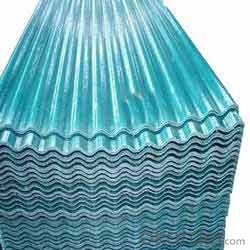
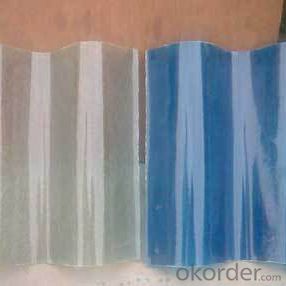
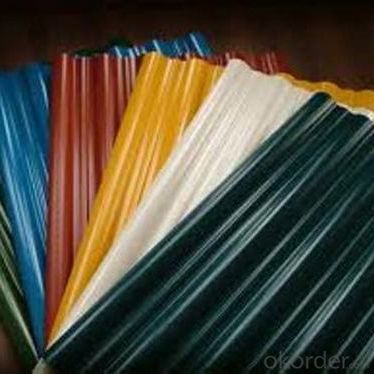
- Q: Are FRP roofing panels resistant to UV rays?
- Yes, FRP roofing panels are generally resistant to UV rays. The panels are specifically designed with UV inhibitors that protect them from the damaging effects of sunlight, allowing them to maintain their structural integrity and aesthetic appeal over time.
- Q: Can FRP roofing panels be used in both residential and commercial applications?
- FRP roofing panels are applicable for both residential and commercial use, as they are recognized for their durability, strength, and long-lasting qualities. Their versatility allows them to be utilized in a wide array of applications. For residential purposes, FRP panels can be employed for roofs, skylights, carports, or patio covers, safeguarding against extreme temperatures, UV radiation, and heavy rainfall. Similarly, in the commercial sector, FRP roofing panels are commonly utilized in warehouses, factories, agricultural buildings, shopping centers, and office complexes due to their exceptional resistance to corrosion, chemicals, and fire. This reliability makes them a preferred choice for commercial structures. Furthermore, FRP panels offer customization options in terms of profiles, colors, and sizes, enabling them to be tailored to the specific requirements of any residential or commercial project. They are lightweight and easy to install, requiring minimal maintenance. Additionally, their commendable insulation properties contribute to energy efficiency in both residential and commercial constructions. In conclusion, FRP roofing panels are highly versatile, providing durability, strength, and protection against environmental elements. They are suitable for various applications in both residential and commercial settings.
- Q: Are FRP roofing panels suitable for hospitals?
- Yes, FRP (Fiberglass Reinforced Plastic) roofing panels can be suitable for hospitals. FRP roofing panels have several advantages that make them a good choice for healthcare facilities like hospitals. Firstly, FRP roofing panels are highly durable and long-lasting. They are resistant to corrosion, weathering, and UV rays, which ensures they will maintain their structural integrity over time. This durability is crucial for hospitals, as it ensures the roofing system can withstand harsh weather conditions and potential damage from external factors. Secondly, FRP roofing panels are lightweight, which makes them easier to install and maintain. This can be particularly beneficial for hospitals, as it reduces the potential disruption to the facility during installation and any future maintenance or repairs. Furthermore, FRP roofing panels have excellent thermal insulation properties. They can help regulate the internal temperature of the hospital, ensuring a comfortable environment for patients and staff. Additionally, FRP panels are also soundproof, which can help reduce noise pollution in critical areas of the hospital, such as operating rooms or patient rooms. Another advantage of FRP roofing panels is their resistance to fire. They have a high fire resistance rating, which is crucial for hospitals to ensure the safety of patients and staff. In the event of a fire, FRP panels can help contain the spread and minimize the damage. Lastly, FRP roofing panels are available in a variety of colors and finishes, allowing hospitals to choose a design that matches their aesthetic preferences. This can contribute to creating a pleasant and calming atmosphere for patients, which is essential for their well-being and recovery. In conclusion, FRP roofing panels are suitable for hospitals due to their durability, lightweight nature, thermal insulation properties, fire resistance, noise reduction, and aesthetic options. These qualities make FRP roofing panels a practical and reliable choice for healthcare facilities.
- Q: Are FRP roofing panels resistant to chemical spills or leaks?
- Yes, FRP (Fiberglass Reinforced Plastic) roofing panels are generally resistant to chemical spills or leaks. The combination of fiberglass and plastic materials used in FRP panels makes them highly durable and resistant to a wide range of chemicals. However, it is important to note that the specific resistance can vary depending on the type and concentration of the chemical involved. It is recommended to consult with the manufacturer or supplier for detailed information on the compatibility of FRP panels with specific chemicals.
- Q: Can FRP roofing panels be used in parking structures?
- Certainly! FRP (Fiberglass Reinforced Plastic) roofing panels are indeed applicable in parking structures. These panels possess characteristics such as being lightweight, durable, and displaying excellent resistance against weathering, UV radiation, and corrosion. Consequently, they are highly suitable for outdoor usage, including parking structures. Furthermore, their installation and maintenance procedures are effortless, which proves advantageous for large-scale projects like parking facilities. Moreover, FRP roofing panels can be specifically crafted to allow high light transmission, thereby reducing the necessity for artificial lighting during daylight hours and enhancing visibility within the parking structure. To summarize, FRP roofing panels offer a cost-efficient and effective solution for parking structures, ensuring long-lasting durability and an aesthetically pleasing roofing alternative.
- Q: Can FRP roofing panels be installed on pergolas or patio covers?
- Pergolas or patio covers can indeed have FRP (Fiberglass Reinforced Plastic) roofing panels installed on them. These panels are not only lightweight but also durable and resistant to weathering, making them an ideal choice for outdoor structures such as pergolas and patio covers. Their purpose is to shield against the elements while still allowing natural light to pass through, effectively creating a cozy and appealing outdoor area. What's more, FRP roofing panels are known for their easy installation and maintenance, which is why they are highly favored by DIY enthusiasts. Nevertheless, it is crucial to ensure that the pergola or patio cover possesses the necessary structural strength to support the weight of the FRP roofing panels before proceeding with the installation.
- Q: Can FRP roofing panels be used for RV or boat covers?
- Yes, FRP (Fiberglass Reinforced Plastic) roofing panels can be used for RV or boat covers. FRP panels are known for their durability, strength, and resistance to weather elements, making them an ideal choice for protecting RVs and boats from the sun, rain, and other environmental factors. These panels are lightweight, which makes them easy to install and handle, and they can provide effective insulation against heat and cold. Additionally, FRP panels are often UV resistant, preventing them from yellowing or deteriorating under prolonged exposure to sunlight. Overall, FRP roofing panels offer a reliable and cost-effective solution for RV and boat covers.
- Q: Can FRP roofing panels be cut to size?
- Yes, FRP (Fiberglass Reinforced Plastic) roofing panels can be cut to size.
- Q: Can FRP roofing panels be used in areas with extreme temperatures?
- FRP roofing panels are capable of being utilized in regions experiencing extreme temperatures. These panels possess remarkable thermal insulation qualities as well as the ability to withstand a broad spectrum of temperatures, encompassing both hot and cold climates. Their design is engineered to resist thermal expansion and contraction, rendering them fitting for areas with substantial temperature fluctuations. Furthermore, FRP panels exhibit exceptional UV resistance, enabling them to endure intense sunlight and prevent color fading or degradation. Nevertheless, it is critical to verify that the FRP roofing panels being employed are appropriately rated for the specific temperature extremes in the given area to ensure optimal performance and longevity.
- Q: Can FRP roofing panels be used for libraries?
- Libraries can indeed utilize FRP (Fiberglass Reinforced Plastic) roofing panels. These panels are a versatile roofing material that offer a multitude of advantages for various applications, including libraries. To begin with, FRP panels are lightweight yet highly durable, making them an ideal choice for roofing projects. They possess resistance against corrosion, UV rays, and extreme weather conditions, ensuring long-lasting protection for library buildings. This durability also reduces the need for frequent maintenance and replacement, resulting in cost savings in the long term. Furthermore, FRP panels come in a wide range of designs, colors, and finishes, giving libraries the option to select a roofing style that complements the overall aesthetics of their buildings. This ensures that libraries maintain their architectural appeal while benefiting from the practicality offered by FRP roofing panels. Additionally, FRP panels provide excellent insulation properties, aiding in temperature regulation and reducing energy consumption within libraries. This contributes to a more comfortable and energy-efficient environment, ultimately enhancing the overall experience for library visitors. Moreover, FRP panels are easy to install and can be customized to meet specific design requirements, enabling libraries to create unique roofing solutions. These panels can be easily cut, shaped, and installed, streamlining the installation process and minimizing complications. To conclude, FRP roofing panels are a suitable option for libraries due to their durability, design flexibility, insulation properties, and ease of installation. Utilizing FRP panels for library roofs ensures long-lasting protection, enhances architectural aesthetics, promotes energy efficiency, and guarantees a comfortable environment for library-goers.
Send your message to us
FRP Roofing Panel - UV Blocking FRP Lighting Board, High Transmittance
- Loading Port:
- Shanghai
- Payment Terms:
- TT OR LC
- Min Order Qty:
- 200 m
- Supply Capability:
- 100000 m/month
OKorder Service Pledge
OKorder Financial Service
Similar products
Hot products
Hot Searches
Related keywords
